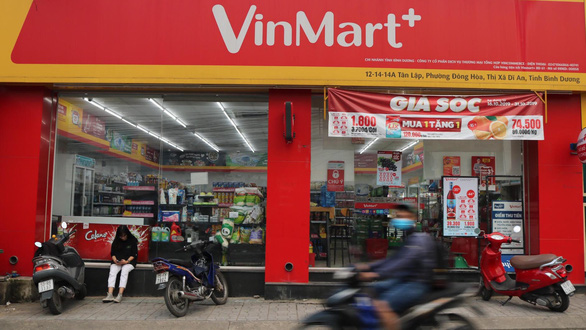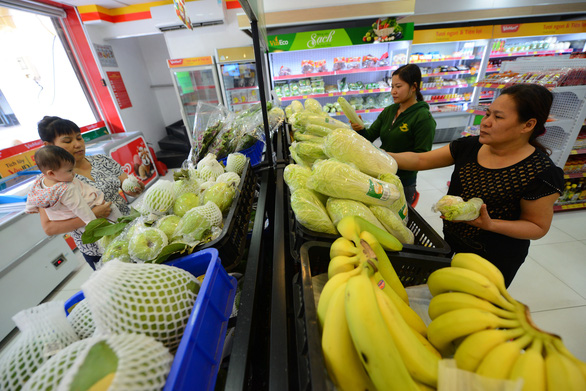When news broke last week that one of Vietnam’s largest conglomerates, Vingroup, had plans to sell off its retail and agricultural arms to Masan Group, a major player in Vietnam’s fast-moving consumer goods (FMCG) market, industry insiders were unsure what to make of the announcement.
The official line from Vingroup is that the deal is expected to provide the company with the resources it needs to focus its energy on technology and production sectors.
Meanwhile, Masan’s strong position in the FMCG market will allow it to fully leverage the massive retail network that Vingroup has built over the past few years.
Under an agreement reached on Tuesday, Vingroup’s VinCommerce and VinEco arms will be acquired by Masan and incorporated into Masan Consumer Holdings, which is Masan’s consumer retail business.
Vingroup will exchange its shares in VinCommerce for a minority stake in a grand new retail company to be formed after the acquisition.
Vingroup vice-chairman and general director Nguyen Viet Quang told Tuoi Tre (Youth) newspaper that both sides are still negotiating Vingroup’s exact ownership ratio, but the deal “is set to take place in December 2019.”
Once the deal is inked, Masan will assume control of VinCommerce’s 2,600 VinMart supermarkets and VinMart+ convenience stores spread throughout 50 cities and provinces in Vietnam, giving it access to VinCommerce’s millions of customers.
Masan will also take control of VinEco’s 14 high-tech farms.
In August, Vingroup transferred the entirety of its shares in VinCommerce to VCM, a newly-formed subsidiary with a total of VND4,573 billion (US$197.7 million) in investment capital, 64.3 percent of which was contributed by Vingroup.
The move was seen by many as the beginning of Vingroup’s restructuring in preparation for the Masan deal.
Vingroup’s new direction
Before the merger, retail and agriculture were among Vingroup’s eight main businesses – real estate, resorts, retail, industry, technology, health, education, and agriculture – with retail ranking second in terms of revenue.
|
|
| Consumers shop for fruits at a VinMart supermarket inside Vincom Center on Dong Khoi Street in District 1, Ho Chi Minh City. Photo: Quang Dinh / Tuoi Tre |
In the first nine months of this year, Vingroup’s retail arm reported VND21,833 billion ($943.5 million) in revenue, making up 24 percent of the company’s total.
That number pales in comparison to the 59 percent of total revenue, VND54,905 billion ($2.4 billion), its real estate operations brought in during the same period.
Since its inception, VinCommerce immediately sped down a path of rapid expansion by increasing the number of its stores through both real estate and corporate acquisitions, including the purchase of Nhat Nam JSC’s Fivimart – a chain of 23 supermarkets – as well as its April purchase of Shop & Go’s 87 convenience store locations, and, most recently, Queenland Mart.
Vingroup had previously announced a target of expanding its VinMart and VinMart+ networks to 300 and 10,000 outlets, respectively, by 2025, however over the last few years retail has accounted for the corporation's highest loss-making sector, according to a report by VnExpress.
Between 2018 and 2014, its pre-tax losses skyrocketed from VND279 billion ($12.05 million) to VND5.1 trillion ($220.26 million).
According to Vingroup, it still expects to profit off the retail network after the merger, given that Vingroup has built VinMarts in most of its residential and commercial complexes and will also retain a yet-to-be determined stake in the business.
After the sale, the conglomerate is expected to refocus itself on its core areas – technology and manufacturing.
Over the past two years, Vingroup has begun chiseling out a piece of Vietnam’s transportation market with the introduction of its locally-manufactured motorbikes and automobiles under its VinFast brand.
It has also launched VSmart smartphones and has widely publicized its foray into the production of 5G-related technologies.
By the end September 2019, the group’s total production assets had been valued at VND84,028 billion ($3.6 billion), second only to Vingroup’s real estate arm which was valued at VND166,119 billion ($7.2 billion), though in its early stage the real estate arm’s production activities incurred VND4,687 billion ($202.5 million) in pre-tax losses.
|
|
| Consumers shop at a VinMart+ store on Vo Thi Sau Street in Vung Tau City, located in the southern province of Ba Ria-Vung Tau. Photo: D. Khoi / Tuoi Tre |
Masan looks to reinforce its retail
As one of Vietnam’s leading retail groups, with subsidiaries including consumer retail arm Masan Consumer, lender Techcombank, meat business Masan MEATLife, and mining arm Masan Resources, Masan's retail has long been key to Masan Group Corporation’s business operations.
In its 2018 annual report, Masan outlined a strategy to create a commercial ecosystem to meet the daily needs of consumers through each of its individual business segments by setting up a series of 'one-stop shops' that would allow customers to tackle their finance, grocery, and healthcare needs all in one place.
At FPT Techday 2019 in November, Nguyen Anh Nguyen, deputy general director of Masan, said that the company was already looking to tackle the challenges presented by China’s Alibaba and America’s Amazon as they began to make their entrances into the Vietnamese market
“If Vietnamese manufacturers, including Masan, are not careful, in three to five years we may still have our brand building and production capabilities but we will have lost the distribution market,” Nguyen said.
The 2,600 store-strong VinMart and VinMart+ network, therefore, will come in handy in facing this challenge, as well as help the group grow its burgeoning consumer goods and retail empire.
However, Masan is still exposed to other major challenges in the short term, particularly in terms of generating retail profits.
Last year, Masan Consumer reported pre-tax profits of VND3.8 trillion ($164.09 million), while VinCommerce lost VND5.1 trillion ($220.23 million).
On Tuesday, when the merger was announced, MSN shares of Masan Group Corporation on the Ho Chi Minh Stock Exchange (HoSE) crashed seven percent, wiping VND5.6 trillion ($242 million) off the stock’s market capitalization.
By 11:00 am on Wednesday, the stock had lost an additional 4.2 percent.
Like us on Facebook or follow us on Twitter to get the latest news about Vietnam!


















































